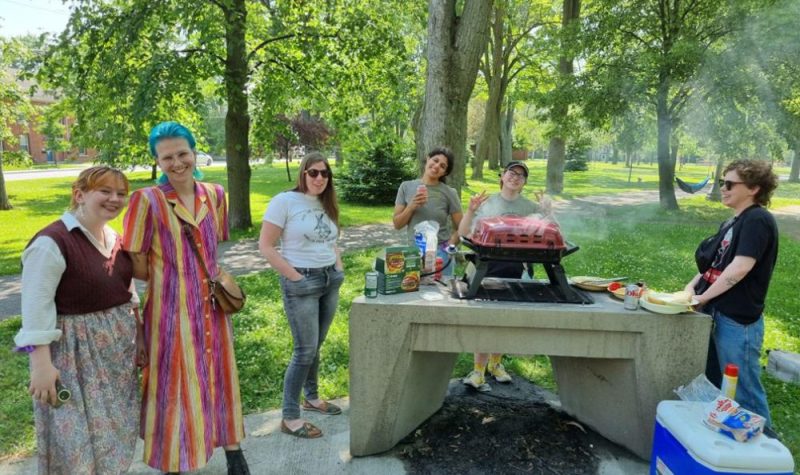The week after the City of Kingston’s official Pride parade and celebrations and in the last weekend of Pride Month, local organizers hosted the Liberation Day Picnic, providing a space for both celebration and recollection.
The picnic took place at Victoria Park on Sunday afternoon with about 30 attendees and there were speeches delivered by local advocates Luna Johnson, Juno B, and Jirjees. The goal of this event was to host an explicitly political and historically-rooted event, where queer people can network, organize, listen to speeches, and enjoy a day in the park, according to organizers.
“It's basically an event that's run by and for queer people, so that we can have an event and space for ourselves without necessarily being a spectacle or an ornament for a non-queer audience,” stated Luna Johnson, an organizer of the event.
The title of "Liberation Day" references a key event in queer history: the name dates back to the 1970 Christopher Street Gay Liberation Day March, a march in New York City on the anniversary of the Stonewall riots in 1969.
“I really like going back to the words ‘Liberation Day’ because it emphasizes a place of history and politics and it places them front and center,” Johnson stated, “It makes it explicitly the goals of the event to promote queer liberation. And the word pride has lost a lot of its original meaning as like queer contexts have really changed, which I think is unfortunate.”
Johnson traces the inspiration for the local event back to the pandemic.
“It was a long while without Pride. And so both myself and I feel like a lot of queer people have had that time away from these very traditional city pride ceremonies and just had stewed in our thoughts of what pride is and sort of came to a lot of realizations that these events weren't as perfect and ideal as we had in our heads and we were able to realize a lot of things that were missing things that we wanted more out of the particular day," Johnson said.
"So I started talking to a lot of friends of mine and they tended to share a lot of the same sentiments, especially those that worked on Pride boards," Johnson added. "And pretty much like the biggest redeeming factor that we had with those Pride events and the reason that people always wanted to come back was really just the community. It didn't really have anything to do with the organization or the activities that were going on, anyone speaking, anything like that. It was just that it was a space that everyone you knew that was queer was going to be there and you could socialize as if it was a reunion.”
Johnson also discussed the significance of the event in comparison to some of the other celebrations this month.
“I think a lot has been lost with Pride in recent decades. There hasn't really been a lot of substance to our Pride events. I think it's important to consider not just what's been lost, but what else can be done with such a powerful and significant event. A lot of these city pride events are getting a ton of funding and they have so many people attending them, but they're not really used for any sort of political purpose. They're not used to improve the lives of queer people much. I think Pride events should be a space where people are able to learn about queer history, learn about how to organize, learn about our culture, and create new culture."
"I don't think there'd be anyone calling for an erasure of city pride events," Johnson said. "I think they definitely have their place, but I think they're fundamentally missing a lot of things. And I think these sorts of pride events and offshoots of the main city pride are happening for a reason.”
While the Liberation Day Picnic may hold a different significance than other events, they are certainly not mutually exclusive. While lighter events have their place, Johnson and those involved in the Liberation Day Picnic hope to inspire political mindfulness and a critical lens.
Listen to the story featuring an interview with organizer Luna Johnson below:


